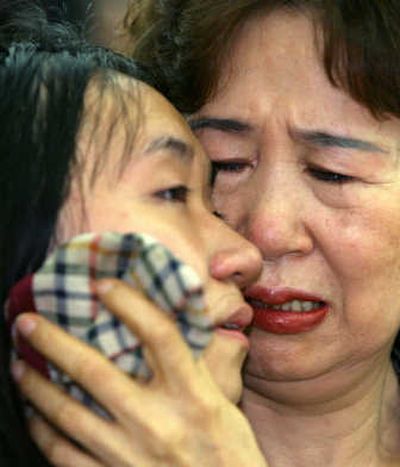Korean hostages return home amid criticism

SEOUL, South Korea – Looking wan and exhausted and apologizing for the trouble they have caused their nation, South Korean missionaries held hostage for six weeks in Afghanistan arrived home early today.
The 19 young Christians released last week by Taliban captors returned to a country thankful for their safe return but angered by what has been widely portrayed as the recklessness of the missionaries and the church that sent them into a war zone.
Moments after landing at Incheon International Airport, one of the released hostages apologized.
“Unexpectedly, we were kidnapped, and we are very apologetic and sorry for the trouble we caused our government and our people,” said Yoo Kyung Sik. “We thank everyone for thinking about us and allowing us to come back home.”
The missionaries were immediately taken to a hospital for checkups and a reunion with their families.
The kidnappings have caused a public rift in South Korea’s large and prosperous Christian community. Worried about an anti-Christian backlash in this traditionally Buddhist country, mainstream Protestant groups have promised to refrain from sending missionaries into conflict areas and have distanced themselves from the church that sponsored the missionaries held hostage.
The Saemmul Church, a large congregation in an upscale southern suburb of Seoul, ignored a warning from the government in February not to send its missionaries to Afghanistan. The written warning said the Taliban were known to be planning to abduct South Koreans to win the release of prisoners.
Once the missionaries arrived in Afghanistan, their behavior appeared to compound that risk. They made themselves conspicuous targets by traveling overland by night in a rented bus and hired a driver who turned out to be a Taliban associate. He quickly handed them off to armed kidnappers.
In response to public anger over this seeming recklessness, the South Korean government, which negotiated the hostages’ release and was reported by the Reuters news agency to have paid a $20 million ransom, is demanding that the church and families of the hostages repay some of the costs of bringing them home, including airfare, medical treatment and the transport of the bodies of two missionaries murdered by their captors.
The South Korean government said it has not yet decided whether to demand that the church and families shoulder the entire cost of its negotiations with the kidnappers. That effort, according to media reports here, included the use of agents from South Korea’s spy agency, National Intelligence Service.
Quoting an unnamed senior Taliban leader, Reuters reported Saturday that the South Korean government paid more than $20 million to secure the freedom of its citizens.
“With it, we will purchase arms, get our communication network renewed and buy vehicles for carrying out more suicide attacks,” the commander told Reuters on condition of anonymity.
The South Korean government on Saturday denied any payment was made, as it has several times in recent days.
The Taliban kidnapped 23 South Korean missionaries on July 19 as they traveled from Kabul, the Afghan capital, to the southern city of Kandahar. The kidnappers killed two male hostages in July and released two women last month.
The abductions appear likely to deflate a booming Christian missionary effort based in South Korea. The country is second only to the United States in the number of missionaries it sends around the world – 16,200 at least count.
After the release of the hostages, the two largest mainstream Protestant umbrella groups in South Korea accepted the government’s ban on future missionary work in Afghanistan, one of the conditions negotiated for freeing the hostages.
“Korean churches should no doubt respect the agreement to completely end evangelical work” in Afghanistan, said a statement from the National Council of Churches in Korea.
The church groups have also agreed to an overhaul of missionary preparations, including security training and closer cooperation with the government in staying out of dangerous countries.